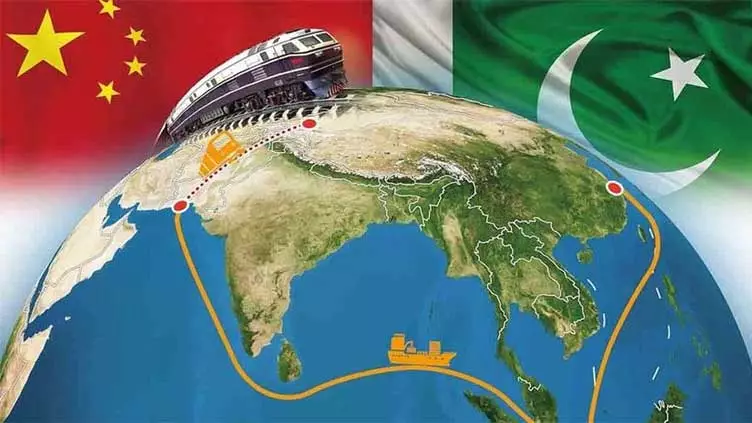ISLAMABAD, August 1(ABC): China Pakistan Economic Corridor (CPEC) project is once again kicking off after a decelerated stage during previous few years as the present government reiterates resolve to resume the pace of work as witnessed during 2013-2018.
The Pakistan Muslim League – Nawaz (PML-N) led coalition government initiated China Pakistan economic Corridor had experienced sluggish advancement during Pakistan Tehreek-e-Insaaf government with number of projects under the Corridor delaying due to unknown reasons.
The ministry of Planning, Development and Special Initiatives under the supervision of its minister Prof. Ahsan Iqbal has resumed the activity and started interacting with the Chinese concerned authorities to expedite work especially on the stalled projects and include new avenues in the mega project.
Both Pakistan and China are engaged in finalizing the agenda of 11th Joint Coordination Committee (JCC) on CPEC where number of new projects in sectors like agriculture, information technology, tourism and others would be considered besides reviewing work on the ongoing projects.
According to sources in ministry of planning, the 11th JCC is likely to be held by next month. Although, the venue has not yet been finalized yet most probably it would be held in Beijing, China.
Both Pakistan and China are also mulling over extending the scope of CPEC to Afghanistan and the matter was also discussed at a meeting chaired by Ahsan Iqbal.
Foreign Secretary Sohail Mahmood, gave a detailed briefing on the third-party participation and extension of CPEC to Afghanistan.
There is also possibility of holding the meeting of Joint Working Group in Energy between Pakistan and China during first week of August where the issues of 1124 MW Kohala and 700.7 MW Azad Pattan hydro power projects as well as 1320 MW Thar Coal power plant project would be taken up with the Chinese side.
A joint study for the future development of Thar Coal had also been made part of the agenda.
Two key run of the river hydropower projects have recently completed under the umbrella of CPEC. The 720 MW Karot Hydrepower project has already started its commercial operation while production of electricity from the 880 MW Suki Kenari hydro power project would start soon.
“CPEC is back on track and measures are underway to provide sufficient power for Gwadar city,” said Ahsan Iqbal at a meeting held to review preparations for 11th JCC meeting and stressed the need for renewable energy projects for the city’s development.
According to Daily China Net, exports have been set in motion for the first time in the Gwadar Free Zone in the backdrop of exemption from taxes and customs duties for a period of 20 years.
Along with exports to foreign countries, the Gwadar Free Zone (GFZ) – both south and north – has also kick-started supply of trade articles and manufacturing items to the local market of Pakistan.
Both phenomenal steps, aligned with the e-Custom (Web-based One Custom – WeBOC) system are aimed at helping Pakistan realise its dream to become a high-performing export-oriented country in the international trading landscape.
Agvon, an enterprise incorporated into the Gwadar North Free Zone that deals in fertilizers import and processing, said it would sell 20,000 tons of potassium sulphate to Pakistani and international markets.
The company is expected to start its production facility by the start of next year. For this purpose, Agvon has already acquired 10 acres of land and the manufacturing setup is under construction.
Moreover, another industrial concern operating in the Gwadar Free Zone, HK Sun Corporation, will export its consignment to the tariff area in Pakistan.
Talking about overall progress of CPEC, an official in the planning ministry informed that under first phase of the CPEC, numerous major energy projects including hydro, wind and solar projects were executed.
“The second component of the CPEC is infrastructure, highways, waterways and bridges which have been built across Pakistan, improving the communication and road infrastructure,” he added.
The important part of physical infrastructure was laying the fiber optic link from Chinese border to Pakistan to help the communication network.
The official said that the third important component of the first phase was the Gwadar port which was almost functional.
Another infrastructure project, the East Bay Express has been recently inaugurated besides progress on International Airport in Gawadar and many of the allied infrastructure and industrial development projects.
About special Economic Zone (SEZs) being set up in Gwadar, the official said, a large number of Chinese companies were setting up their businesses at SEZs.
The country was entering into phase two that is even more important and focused on industrialization, agriculture, social well-being of the people, poverty alleviation and green economy.
“Under the Green Corridor, the government is focusing on agriculture and food security and digital corridor to fully utilize China’s experience and expertise in IT and industrial sectors,” the official said.
Pakistan is currently developing five out of nine SEZs nominated under CPEC including Allama Iqbal Industrial City in Faisalabad, Punjab, Dhabeji SEZ in Sindh, Rashakai SEZ in Khyber Pakhtunkhwa and Boston SEZ in Balochistan.
Another fast-track SEZ is Gwadar Free Zone as its phase at an area of 60 acre land is already fully functional and the mighty second phase spanning over 2200 acres is under construction.
Dozens of Chinese firms are operating at Pakistan’s various economic zones as both the governments were actively engaged to carry forward the SEZ projects and making them operational at the earliest possible.
Meanwhile, the government is also keen to attract foreign direct investment in textile, IT, agriculture, science and technology and mining sectors to boost exports and bridge the gap between imports and exports.

